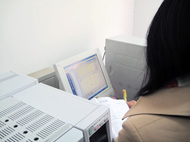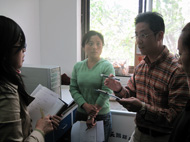Events
Special seminar of GCOE program, "Know-how of analytical method development"
Date: April 25 - 29, 2009
Venue: Tsinghua University, China
Organized by:
Kyoto University Global COE Program "Global Center for Education and Research on Human Security Engineering for Asian Megacities"
Co-organized by:
Kyoto University EML Program "international Center for Human Resource Development in Environmental Management"
Number of attendants: 5
Report 034
Outline
In Prof. Wang Wei's laboratory in Department of Environmental Science and Engineering of Tsinghua University, they conduct research on effective utilization of methane gas produced by waste. They analyze methane gas and organic acid such as acetic acid and valeric acid using GC; however there has been a problem possibly caused by the lack of analysis techniques, for example, getting a result that differs greatly from a theoretical value. There is, however, no instructor in the lab who is knowledgeable about environmental analysis. Therefore the staffs need to deepen their understanding of environmental analysis by attending seminars and learning practical skills. This seminar aimed at the following: to answer the participants' questions on analysis using the equipment they usually manage, to review the current analytical condition, and to teach know-how of analytical method development and help them acquire it. The seminar was also expected to enhance the partnership between the Shenzhen base and Tsinghua University.
Report
At the beginning of the seminar, the instructor held a hearing on issues the participants have in their daily analyses. By then, their analysis had yielded results that were considerably different from a theoretical value. Hence we agreed on the need for pinning down causes and making improvement. In the seminar we reviewed on the proper use of basic apparatus, principals of GC/FID, pretreatment methods, and measurement conditions. The participants were well versed in the use of laboratory glassware, but some incorrect operations of the equipment that could cause errors were spotted. Then appropriate directions and explanation of the errors were given. Similarly we reviewed pretreatment methods step by step; thereby we were able to reduce the number of errors. Additionally we went over the conditions of the daily-used GC/FID. We checked the measurement condition first, and then found out that measurements were made under the condition that column temperature was lower than the boiling point of several object substances. We therefore performed column washing for a whole day; however we could not lower the blank level at which we could measure the concentration of object substances. We picked up a column that was applicable to analysis of organic acid, and attempted its analysis. Specifically we considered conditions that we could attain quantifiable separation and a peak stage, changing the condition of increasing temperature. As the result, we achieved a reasonable peak shape and separation. Because of a time restriction, we did not achieve the establishment of conclusive measurement condition. We acquired, however, good understanding of procedures for examination of analytical methods by the hands-on experience.


